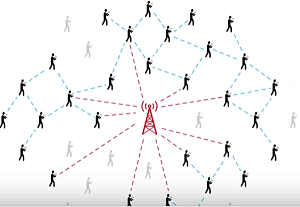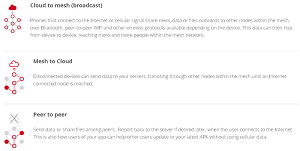News
MeshKit SDK Provides Peer-to-Peer Connectivity for Offline Phones
- By David Ramel
- March 2, 2017
Open Garden Inc. announced a MeshKit SDK to let third-party developers incorporate the company's peer-to-peer connectivity into their mobile apps for offline scenarios.
The MeshKit SDK is designed to provide connectivity to devices that can't access a cellular network or hook into the Internet through a Wi-Fi service. It does that by leveraging a variety of wireless protocols that are available for various devices running iOS or Android. Initially, however, Open Garden told ADTmag that the MeshKit SDK is available only for the Android platform, with an iOS version "coming soon."
The idea behind the new initiative is that when no regular network access is available, devices can use Bluetooth, Bluetooth LE, Wi-Fi Direct, ANT and other wireless protocols to connect to other devices that are using the same technology, forming an ad-hoc peer-to-peer mesh network that eventually connects to a device providing Internet access.
Signals can hop from device to device throughout the mesh network until they find a device with regular connectivity that can provide a bridge to the Internet. After that, it's networking business as usual, as connected devices can act like normal, sharing news, data, files, Android app updates and so on.
 [Click on image for larger view.]
A Mesh Network (source: Open Garden)
[Click on image for larger view.]
A Mesh Network (source: Open Garden)
The San Francisco start-up is attempting to enlist third-party developers, media producers, telecom operators and other organizations to take part in the new initiative.
The company's Web site message to developers is: "With MeshKit developers can reach users who are not connected to the Internet because they don't have a data plan for example. Engagement and sessions within your app are increased with a new form of device-to-device connectivity. Content delivery costs are reduced as data traveling over the mesh is free."
 [Click on image for larger view.]
How Does it Work? (source: Open Garden)
[Click on image for larger view.]
How Does it Work? (source: Open Garden)
The SDK won't be free to developers, however, but Open Garden hasn't disclosed any fee structures or other pricing details. The company told ADTmag that developers can contact it to get pricing details and obtain access to the SDK. "MeshKit is most relevant to large app developers, media companies, telecom operators, government agencies and NGOs who already have mobile app with over 5 million monthly active users (MAUs)," the company's Web site states. "If your company matches this description we'd love to hear from you."
Features of the MeshKit SDK highlighted by the company include:
- Cross-platform. Android and iOS libraries with example apps.
- Off-grid routing. Advanced traffic management capable of multi-hop and store and forward. Best-efforts delivery of short UTF-8 messages and content (up to 4kb per message currently).
- Nearby discovery. MeshKit can alert users when others are nearby.
- Seamless content exchange. MeshKit pairs the devices, selects the best communications path and requires no extra effort by the end user.
- Battery efficient. Transmitting data over the mesh is free and requires less battery than using 3G or 4G.
- Built-in security. End-to-end encryption for private messages and cryptographic authentication of all senders.
- Integrates well. Websocket API to integrate MeshKit connected phones with backend services.
- Multi-channel support. Separate namespace for each customer's usernames and channels (such as chatrooms).
- Smart sending. Unicast private message delivery, multicast private group message delivery.
- User control. Publish/subscribe to public multicast channels.
While lack of connectivity can be caused by various scenarios, the company said the technology is especially suited for developing areas. Open Garden is partnering with Studio Sol, a large music app publisher based in Brazil. for an early use case.
"Offline is the new frontier," said Open Garden's CEO Paul Hainsworth in a statement this week. "The impossible is now possible with MeshKit: reach people on their smartphones even when they are offline. App developers worldwide can now reach audiences even when they are disconnected from the Internet to share rich media, enable offline transactions, and grow the number of their users in an unprecedented way. Studio Sol will greatly benefit from this technology to grow its audience in Brazil with the new experience of offline music discovery."
About the Author
David Ramel is an editor and writer at Converge 360.